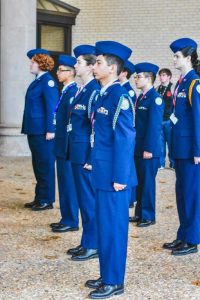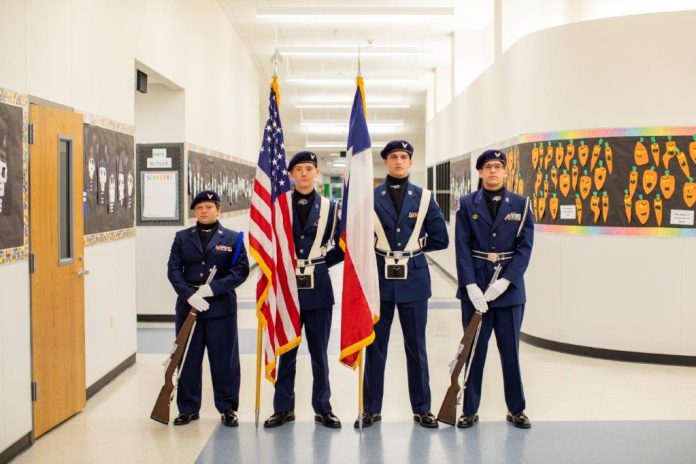At 17 years old, Flower Mound senior Jeremy Olive already has eight cadets who report to him and recently earned his private pilot license. Just down the road at Marcus, Emily Kaslik’s dream of being a pilot for the United States Air Force is not a matter of if, but when. Her teammate, Gavin Kurkowski, confidently marched into the oldest private and senior military college in the United States, Norwich University, last year and attended a two-week cyber academy — when he was just a sophomore.
All three can credit those opportunities, along with their engrained attributes of responsibility, confidence, integrity, leadership, and tenacity, to one fateful decision — joining the Air Force Junior Reserve Officers’ Training Corps program at their school.
And the best part is that there are hundreds more students just like them.
“Last year, 85% of students eligible to take AFJROTC for a second or subsequent semester did so. That’s pretty impressive for an elective course,” Benito G. Salinas, CMSgt, USAF (Ret.), said. “Many describe it as their favorite course. … The cadets often call AFJROTC a ‘family.’”
Flower Mound program head, Lt. Col. David Hansen, USAF (Ret.), agreed.
“You don’t have to ‘make the team,’” he said. “If you want to do AFJROTC, you are on the team by simply joining. AFJROTC has many benefits, including having an instant friend group and long-lasting friendships based on a common purpose.”
Does every student who joins AFJROTC at Flower Mound or Marcus want to be in the military someday? No, though there have been students who come from military families and are interested in pursuing a military career as adults. The program is also not a recruitment tactic, though it does follow a military structure and is led by former military members.
It’s a popular program in Lewisville ISD, with units also existing at Hebron, Lewisville, and The Colony.

Marcus, which started its 18-week elective course for freshmen through seniors in 1988, and Flower Mound, which started its cadet-led program in 2001, are Air Force affiliates and strive to have roughly 100 engaged students each year. AFJROTC curriculum is comprised of aerospace science, leadership education, and health and wellness studies. Students who successfully complete the classes are granted credit toward graduation.
Aerospace science includes the heritage of flight, principles of aircraft flight and navigation, human requirements of flight, development of aerospace power, aerospace vehicles, rocketry, space and technology programs, aerospace industry, and cyber technology. Leadership education introduces students to military customs and courtesies, character education, citizenship in the United States, first aid, wellness, health and fitness, basic drill and ceremonies, critical thinking, effective communications, management, human relations and college and career readiness, and preparing them for life after high school.
AFJROTC units complement the curriculum through cooperation and resources from organizations such as NASA and Civil Air Patrol. Cadets compete in drill meets, color guard, academic bowls, leadership camps, cyber defense competitions, athletics, and community service, to name a few. They’ve also flown on CH-47 Chinook helicopters and visited places like the USS Lexington, the Johnson Space Center, and various Air Force bases.
Clearly, they are extremely busy — and decorated.
Seven cadets from Marcus have already earned their private pilot licenses at no charge. One cadet was selected as a National Merit Scholar and served as the school’s valedictorian in 2018. Not to be outdone, Flower Mound placed in the Top 16 nationally at the academic bowl in five of the last 11 years, and 13 of its cadets have earned private pilot licenses.
“What I enjoy the most is seeing the cadet’s self-confidence and leadership increase as they progress through the program,” CMSgt. Salinas said. “AFJROTC is a cadet-led program where the cadets hold individual jobs within the cadet corps. AFJROTC also has plenty of community service opportunities. Those things alone help make college or job applications significantly easier since, basically, they are building their resume throughout their time in the cadet corps.”
Lt. Col. Hansen agreed. His favorite job in the Air Force was as a soccer coach and PE teacher at the Air Force Academy. He’s now in his 10th year of AFJROTC and is driven by the desire to help high school students.
“When I began in 2012, the program had 56 students,” he said. “It took a concerted effort from instructors, cadets, their parents, administrators, and counselors to get our message out to prospective cadets. After four years of persistence, we surpassed 100 cadets, which is an important benchmark.”








.jpg)








